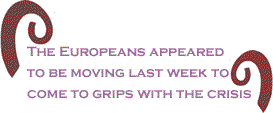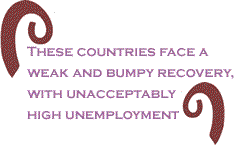When President Obama dispatched Treasury
Secretary Geithner to Wroclaw, Poland
last month to sit in at the meeting of the 17-nation Eurozone
finance ministers, it was because, as he put it later, the
way the Europeans were handling the continent�s debt crisis
is �scaring the world.�  Geithner
dutifully told the ministers; the message and the President�s
later comment were not well received. Geithner
dutifully told the ministers; the message and the President�s
later comment were not well received.
�Obama�s lecture on the Euro crisis
� is overbearing, arrogant and absurd,� editorialized the
German newspaper Bild. �In a nutshell, he is claiming
that Europe is to blame for the current
financial crisis, which is �scaring the world.� Excuse me?�
�The American president seems to
have forgotten a few details,� the paper said.
�The most important trigger of the
financial and economic crisis was U.S. banks and their insane real-estate dealings,
The U.S. is still piling up debt. � The American Congress
is crippled by a battle between the right and the left.
The banks are gambling just as recklessly as they did before
the crisis.
�The president�s scolding is a pathetic
attempt to distract attention from his own failures. How
embarrassing.�
�I found it peculiar that, even though
the Americans have significantly worse fundamental data
than the euro zone, that they tell us what we should do,�
said Austrian Foreign Minister Maria Fekter. �I had expected
that, when he tells us how he sees the world, that he would
listen to what we have to say.�
Was Geithner overbearing in his admonition
to the Europeans? Perhaps. He is said to be that way sometimes.
Was President Obama undiplomatic in publicly rebuking the
Atlantic allies for moving to slow to confront the crisis?
Could be. He has become a lot more outspoken recently.
�In normal circumstances comity would
require deference by others to European authorities on the
resolution of European problem,� Harvard
University economist Lawrence Summers wrote recently. �Now when these problems have the
potential to disrupt growth around the world all nations
have an obligation to insist that Europe
find a viable way forward.�
 The
tone of the Obama Administration�s remarks on the European
economic crisis reflects what Financial Times Martin
Wolf recently referred to as �the panic.� The
tone of the Obama Administration�s remarks on the European
economic crisis reflects what Financial Times Martin
Wolf recently referred to as �the panic.�
�This is code red,� New York Times
columnist Thomas Friedman wrote September 25. �We are facing
a possible global financial contagion triggered by European
banks choking with sovereign debt spreading their woes to
an already weakened U.S.
financial system.�
�I have never see Europe�s policymakers
as scared as I saw them in Washington
last week,� wrote Financial Times associate editor
and European economic columnist Wolfgang Munchau the following
day. The combination of the continent�s credit crunch and
the general world economic slowdown, he wrote, �are about
to throw the Eurozone back into recession.�
Then in a September 29 article titled,
�How to stop a second Great Depression,� financier George
Soros wrote, �Financial markets are driving the world towards
another Great Depression with incalculable political consequences.
The authorities, particularly in Europe, have lost control of the situation. They need to regain control
and they need to do so now.�
Albeit slowly and miserly, the Europeans
appeared to be moving last week to come to grips with the
crisis. The consensus amongst knowledgeable observers appears
to be that a default on its debt is inevitable and we can
expect action to try to prevent �contagion� � that is similar
collapses in Spain,
Portugal,
Ireland and Italy.
 Most
of the current prognosis as dire, but there are those who
think it is not dire enough, that what the chief economist
for the International Monetary Fund called �dangerous new
phase� in the world economy is more perilous than is being
publicly admitted. Most
of the current prognosis as dire, but there are those who
think it is not dire enough, that what the chief economist
for the International Monetary Fund called �dangerous new
phase� in the world economy is more perilous than is being
publicly admitted.
Prominent British economist Will
Hutton, writing in the Observer September 17, suggests
that the situation is even worse than, Geithner, Summers,
and Obama describe � or are prepared to admit. The ailing
euro is part of a wider crisis he wrote, �Our capitalist
system is near meltdown.�
�A 1930s-style crash threatens us
and our financial partners. Collective action is the only
solution,� wrote Hutton, a governor of the London School
of Economics and visiting professor at Bristol University.
�Eighty years ago, faced with today�s
economic events, nobody would have been in any doubt: we
would obviously be living through a crisis in capitalism,
wrote Hutton. �Instead, there is a collective unwillingness
to call a spade a spade. This is variously a crisis of the
European Union, a crisis of the euro, a debt crisis or a
crisis of political will. It is all those things, but they
are subplots of a much bigger story: the way capitalism
has been conceived and practiced for the last 30 years has
hit the buffers. Unless and until that is recognized, western
economies will be locked in stagnation which could even
transmute into a major economic disaster.�
Hutton went on:
�Simply put, the world has trillions
upon trillions of excessive private debt financed by too
many different currencies whose risk is allegedly mitigated
by even more trillions of financial bets which in aggregate
do not minimize the systemic risk one iota. This entire
financial edifice, underwritten by tiny amounts of capital,
has been created over three decades backed by the theory
that markets do not make mistakes. Capitalism is best conceived
and practiced, runs the theory, by hunter-gatherer bankers
and entrepreneurs owing no allegiance to the state or society.�

�This is nonsense. Business and the
state co-generate wealth in a system of complex mutual dependence.
Markets are beset by mood swings and uncertainty which,
if not offset by government action, lead to violent oscillations.
Capitalism without responsibility or proportionality degrades
into racketeering and exploitation. The prospect of limitless
pay is an open invitation to bad, or even criminal, behavior.
Good capitalism cannot happen without referees to blow the
whistle or robust frameworks in which markets can function;
neither is reliably created by capitalism itself, hence
the role of democratic government. Yet the world is trying
to solve the legacy of the last 30 years as if none of this
were true and, instead, that the practice and theories that
created the mess are still valid.�
�US treasury secretary Tim Geithner,
joining EU finance ministers in Poland as again they pondered
how best to end the ongoing euro crisis, was at least recognizing
today�s interdependencies between countries when he urged
his fellow ministers to stop bickering because the markets
were terrified by the threat of a catastrophic event � with
all the risk that posed the US.�
Hutton went on to say that British
Finance Minister George Osborne �was also right to declare
that a strong euro was in Britain�s
interests.�
�But worrying about how a failed
euro might impact on yourself is old speak,� he continued.
 �What
the markets need to hear is that western politicians � whether
in the eurozone or not � see the euro as part of the potential
solution to capitalism�s current crisis, not its cause,
and that they are prepared to do all in their power to support
the reforms necessary to make the euro survive and take
other measures vital to make the world financial system
functional again. Geithner and Osborne must put some money
where their mouths are.� �What
the markets need to hear is that western politicians � whether
in the eurozone or not � see the euro as part of the potential
solution to capitalism�s current crisis, not its cause,
and that they are prepared to do all in their power to support
the reforms necessary to make the euro survive and take
other measures vital to make the world financial system
functional again. Geithner and Osborne must put some money
where their mouths are.�
�If the euro breaks up, the cascade
of subsequent bank failures and debt write-downs will be
no less threatening and Britain
will be pulled into the vortex,� wrote Hutton. Noting that
the EU has created a financial stabilization facility �to
try to hold the line,� Hutton wrote, �But there is no urgency
in launching it; it is still not a proper fund but, rather,
a stop-gap provider of borrowing facilities and it is too
small. As bad, the German and French governments are wedded
to collective European austerity; they want to impose long-term
balanced budgets not only on themselves but chilling austerity
on the unfortunate states which have to borrow to support
their banks and bond markets.�
�An entire continent is to be blighted
by lack of demand in the midst of a capitalist crisis, compounded
by Britain�s scorched earth,
deficit-reduction plans,� wrote Hutton. �Already, many European
banks are technically insolvent, recognized by Christine
Lagarde, the IMF�s new managing director, if not by the
banks themselves.�
Noting the promises by major national
banks in other capitalist powers to lend money is �easing
the crisis for a while� he suggests �the outside world needs
to go much further.�  �Europe�s
stabilization facility must become a fund with a capacity
to lend and intervene to see off speculators: Britain,
the US,
Switzerland and Japan,
along with China
and oil-rich Arab states, need to contribute alongside Germany.� �Europe�s
stabilization facility must become a fund with a capacity
to lend and intervene to see off speculators: Britain,
the US,
Switzerland and Japan,
along with China
and oil-rich Arab states, need to contribute alongside Germany.�
�We are living through the most dangerous
confluence of economic circumstances in modern times,� wrote
Hutton. �Trying to pretend the interdependencies do not
exist or that the collapse of the euro is the answer can
only make matters worse. It is a straight choice: we do
all we can to help each other or risk going down in what
could be the worst economic contraction for a century.�
Economist Paul Krugman wrote in the
New York Times September 26 that he sees �no sign
at all that European policy elites are ready to rethink
their hard-money-and-austerity dogma.� The same could be
seen here at home. �Mr. Geithner asked for a more financially
powerful bailout fund along with short-term stimulus from
Europe�s wealthier economies,� the
Times said editorially last week. �But his ability
to persuade has been undercut by House Republicans who insist
on imposing untimely austerity on the United States.�
But don�t just think of Democrats
versus Republicans .There is an unpartisan U.S. policy elite and it is wedded to the same
dogma. Its members are lined up against any proposal to
stimulate the economy to increase employment while pushing
a series of austere measures, including sharp cutbacks in
social programs such as Social Security, Medicare and Medicaid.
While such a prospect appears to have receded a bit recently
they have not given up by any means.
�One of the main problems today is
too much debt in the global financial system � among sovereigns,
banks, and households, and especially among the advanced
economies,� says IMF chief Lagarde, �This is denting confidence
and holding back spending, investment, and job creation.
These countries face a weak and bumpy recovery, with unacceptably
high unemployment. The eurozone debt crisis has worsened,
and financial strains are rising. Political indecision in
some quarters is making matters worse. Social tensions bubbling
beneath the surface could well add fuel to the crisis of
confidence.�

Lagarde said recently that �Everyone
- including markets - realize that commitments to cut spending
cannot survive a lengthy stagnation with prolonged high
unemployment and social dissatisfaction.�
BlackCommentator.com Editorial Board member
Carl Bloice is a writer in San Francisco, a member of the National Coordinating Committee of
the Committees of Correspondence for Democracy and Socialism and formerly worked for
a healthcare union. Click here to contact Mr. Bloice. |

